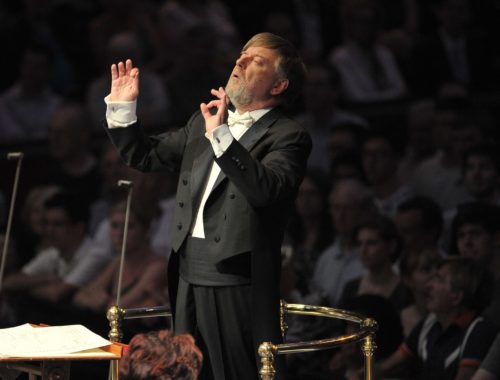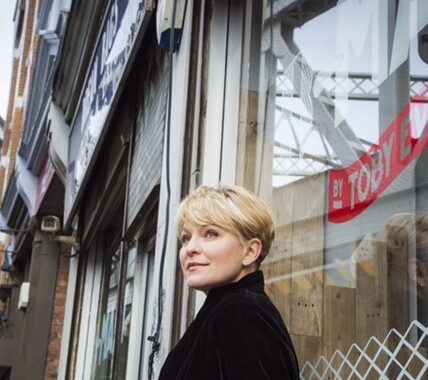Prom 51: London Symphony Orchestra, Bostridge, Harding, Royal Albert Hall (Review)
How better to remember the great Sir Colin Davis than with a life-affirming blast of Tippett brass? Fanfare No.5 from The Mask of Time (arr. Meirion Bowen), xylophone-driven and sounding like it might morph at any moment into an alternative “Ride of the Valkyries”, seemed almost to encapsulate the character of Sir Colin – spry, vigorous, audacious. It was he, of course, who conducted the premiere of Tippett’s hugely ambitious oratorio, reveling in its originality and fertility, and this all-English tribute Prom (which he was to have conducted) was the kind of programme he would have rejoiced in, Elgar’s Second Symphony now substituting for Sibelius’ in glorious valediction. Well, that was the hope, anyway.
Daniel Harding was on the podium and the ample body of London Symphony Orchestra strings, proudly disported, at once chimed with Sir Colin’s taste. He believed in the fullest sonorities founded on and coming up through well-anchored bass lines. But Tippett’s much-loved Concerto for Double String Orchestra does for the enduring spirit of English folk song and dance what Bartok did for the Hungarians and Harding’s response to the outer movements was disarmingly plushy and soft-centred with little or no resilience in the sprung rhythms and no “jazz” in the syncopation. It sung (how lovely were the cellos in their long first movement unison) but in that pale “English pastoral” way and not with Tippett’s full-throated lustiness. The slow movement – with a luminous solo from the leader Carmine Lauri and later cello, Rebecca Gilliver – was bluesily nostalgic with lovely half-lights but its repose was hardly thrown into poetic relief by Harding’s flaccid way with what lay on either side of it.
It pains me to say that worse was to come with Elgar’s Second Symphony where the words from Shelley that Elgar chose to head his score “Rarely, rarely comest thou, Spirit of Delight!” were almost prophetic – meaning that in the low-energy revving up of the opening bars there was every indication that it would not come at all. Elgar himself described this movement as “tremendous in energy” but you would hardly have known as much from Harding’s portentous pacing. Impetus came and went and the extraordinary heart of the movement – the passage Elgar described as “a sort of malign influence wandering through the summer night in the garden” – was so languorous and protracted as to create a fatal imbalance in the whole. Only a Barbirolli could love this music too much (as he sometimes did) and have us wholeheartedly sharing in his conviction. Harding had a view, that’s for sure, but I just didn’t believe him. He doesn’t as yet inhabit this piece and certainly hasn’t yet found a way of making it feel organic. So much of the work’s gravitas and majesty felt manufactured with phrasing so micro-managed that the tiny ritardandi at the end of phrases began to sound like a recurrent mannerism, a bad habit. The lingering indulgence of it all was summed up by those falling string phrases, heartbreaking in pianissimo at the final sunset of the piece. Harding pawed over them to such a degree as to render them shapeless. Astonishing for me and this work – I felt nothing.
But the evening was remarkable for one thing (and this was much more Harding’s bag): Ian Bostridge’s extraordinary account of Britten’s equally extraordinary Les illuminations. The opening proclamation – “I alone have the key to this savage parade” – was a real clarion call, Bostridge leaning into the chromaticism in a way that was at once passionate and menacing. A savage parade indeed. Britten’s understanding of the Rimbaud texts lies with his understanding of their sound so that the sensuousness and cynicism, the wild and sexy glissandi, the onomatopoeic rasp and punch of the words conveys more of their meaning than the elusive and obtuse imagery. And never before have I heard this surrealist play on words acted out – and vocally this was a cracking acting performance – with such clarity, theatricality, and abandon. And yes, those final chords – the dark clouds of war gathering, the love that dare not speak its name under threat – were chillingly sounded and the ensuing silence, held so grippingly by Harding, was testament to the unsettling drama of the performance.
You May Also Like

MUSICALS Podcast: Edward Seckerson meets GINA BECK
30/10/2024
Prom 1, Elgar “The Kingdom. Royal Albert Hall
19/07/2014
2 Comments
Roddy Tutti
I’ve just read other (positive) reviews of this concert, but must say I agree with you almost entirely. Very strange to be left so cold by Elgar’s 2nd. It needed to be more idiomatic and often didn’t feel or sound like Elgar. I’ve often felt the same about Edward Gardner, who has made Britten operas sound (to me) like some unknown piece, not misunderstood so much as ‘un-understood’ and who can’t even do Italian opera idiomatically.
However, I did enjoy the Tippett – especially the slow movement and wonder if perhaps you are too harsh. The outer movements I thought to be half-decent, though no more.
But all in all I felt this young conductor needs to live a little and let himself go – there are plenty of other youngsters who can and do and have.
Tobias Davidson
This is the first review I’ve read which has allowed itself enough space to say something meaningful about the performance. And I agree wholeheartedly with Seckerson’s comments on the Elgar – Harding’s pacing effectively sabotaged any chance of creating an internal dynamo or overall structure for the music. And this turned the piece into a series of set pieces devoid of any unifying emotional narrative. However, because I wasn’t swept up in the emotion of the piece I was perhaps in a better position to concentrate on the orchestra’s wonderful playing – I heard and enjoyed textures and sonorities which were completely new to me; I recognized for the first time that Elgar had not only constructed something huge but invested much creative invention in the intricacies of the part-writing.